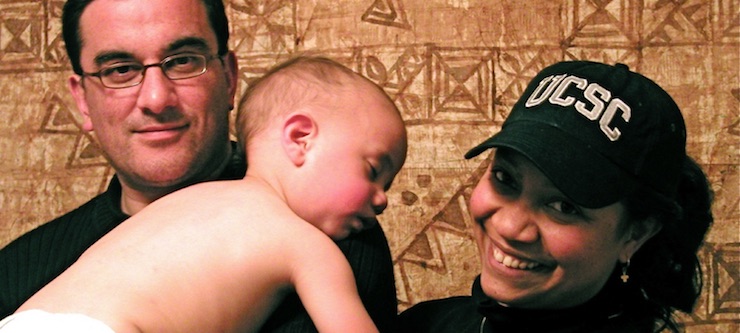By Jim Clifford, Professor Emeritus History of Conciousness
Teresia Teaiwa, History of Consciousness PhD 2001, passed away on 21 March 2017. The cause was pancreatic cancer. Her untimely loss has devastated many friends and admirers. An enormous outpouring of love and support, from throughout Oceania and beyond, accompanied her final weeks. Her husband, Sean Mallon, and two sons, Manoa and Vaitoa, were with her in her last days.
Teresia was a prominent educator, academic innovator, and poet. .She directed the Va‘aomanū Pasifika unit (Pacific Studies and Samoan Studies) at Victoria University in Wellington, Aotearoa-New Zealand, the first and only program to offer a Ph.D. in Pacific Studies. (In this path-breaking project she has collaborated closely with April Henderson, History of Consciousness PhD 2007.)
Born in Honolulu and raised in Fiji, Teresia taught at the University of the South Pacific in Suva before moving to Wellington. Deeply concerned with Fijian culture and politics after a series of military coups, she strongly rejected all forms of ethnic absolutism. Her view of the world reflected a Pacific-centered internationalism. Her father is I-Kiribati (displaced to Fiji from the mine-devastated phosphate island of Banaba), and her mother African American. An understanding of the simultaneously rooted and mobile nature of islander histories and attachments permeated her scholarship, teaching, and creative writing.
An anti-nuclear activist, defender of West Papuan independence, and a critic of militarism, Teresia sustained many alliances and was a widely influential voice. She received prestigious academic fellowships and multiple teaching awards. Her poetry is widely published and appreciated.
A compendium of open access works can be found at:
https://savageminds.org/2017/03/21/remembering-teresia-teaiwa-an-open-access-bibliography/
As a student in History of Consciousness Teresia played a central role in the diversification of feminism through the Research Cluster for the Study of Women of Color in Collaboration and Conflict. She co-edited its important publication, Enunciating our Terms, for the Center for Cultural Studies journal, Inscriptions.
Teresia’s dissertation, "Militarism, Tourism and the Native: Articulations in Oceania". rescued “the Native” from the simplifications of pastoral exoticism, nationalist apologetics, and postmodern condescension. It was an entirely original revision of the history and image of indigenous peoples in the light of experiences of travel and global entanglement. In this and subsequent writing, Teresia built on the work of Epeli Hau’ofa, reconceiving the Pacific from the inside out. The region had long been oversimplified by Western exoticisms and in more recent military and touristic projections. Teresia refigured Oceania as a dynamic space, a native “cosmopolitanism.” She explored how customary patterns of dwelling and traveling were being rearticulated in contemporary national and international contexts. Her approach to the lived “cultures of militarism and tourism” has been particularly important, probing specific personal investments and complex relations of power and reciprocity.
As chair of Teresia’s thesis committee (the other members were Angela Davis and Barbara Epstein), I learned enormously from her insights, gentle prodding, and sense of humor. Her “style” was something unique. Teresia had charisma. At conferences she could address the most difficult points with political and analytic rigor, but always with a lightness of touch and a conversational eloquence that invited discussion.
If you would like to hear her voice I recommend:
https://www.youtube.com/watch?v=lipupbIZb6U
On her extraordinary Pacific-centered teaching:
https://akoaotearoa.ac.nz/mi/node/11225
And a good sample of her irreverent, loving manner can be found at:
https://muse.jhu.edu/article/372572
For an overview of her book-in-progress, a complexly gendered analysis of the cultures of militarism:
http://intersections.anu.edu.au/issue37/teaiwa.htm
We hope that as much of this work as possible can be edited and published before long.
A couple of weeks before she died, Teresia somehow found the energy to respond to a haiku by Matsuo Basho I had sent.
Wrapping dumplings in
bamboo leaves, with one finger
she tidies her hair
“Reminds me of the way my nurses balance blood taking with one hand, sometimes one finger…!”
Everyone who was touched by Teresia’s attentiveness, brilliance and grace will miss her immeasurably.

